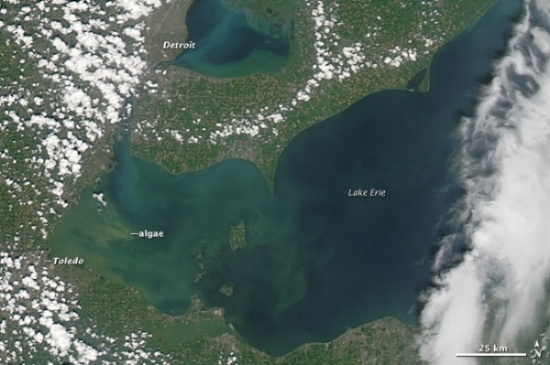CEA's Executive Director, Derek Coronado
by Niharika Bandaru
Windsor of Change was started with the aim that we bring into focus local problems pertaining to climate change and the environment, for the people of Windsor and similar communities.
With that in mind, in a first of a series of interviews on local environment stories, we talked to Derek Coronado, the Coordinator/Executive Director of the Citizens Environment Alliance (CEA), based here in Windsor. He has had over 30 years of experience fighting the good fight, and he continues to do so. Here is an excerpt from our enlightening half-hour conversation on the current state of affairs in Windsor, the effects of climate change on our environment and the way forward.
Let’s get started with the background of the CEA. Can you tell us a little bit about how the CEA got started?
Derek: Well, back in 1985 there was a large spill of perchloroethylene into the St. Clair river from the area known as the "Chemical Valley". That spill started drifting downstream towards Windsor-Essex and because of the repeated failures of the agencies and various governments to respond to it, a group of citizens locally started advocating for a more effective and quicker cleanup as well as pollution prevention planning for the area. That group formed what was later to be known as the CEA, but at the time it was called as the Windsor District Clean Water Alliance.
So it was really a group of concerned citizens focused on reacting to environmental problems; specifically a water quality issue, that started the CEA.
Environmental issues in our area don't affect Windsor-Essex exclusively, they're much bigger than that, because our water isn’t stagnant.
Derek: Yeah, and also the geography of the area as well. We’re nestled in, not only in the Great Lakes, but right on the international border as well. That's why our name was changed in '91, because we realized that the issues were broader and more complex than just focusing on water quality. In this region all the environmental problems are pretty much a regional problem and not specifically local.
Source: Google.ca
What are some of the changes that you’re seeing in Lake Erie and the Detroit River other than the general protection and remediation addressing the areas of concern?
Derek: In terms of the environmental situation here we started off on a fairly weak position. Back in the 80s, people weren’t exactly concerned about climate change. But of course, climate change was rolling along whether we were paying attention to it or not. This meant that as the impacts began to bite harder and harder, so did more heat stress, and more drought conditions. And what we’re trying to do locally is preserve as much habitat and green space and reduce urban sprawl and all that happens on the land that impacts the water.
But, in terms of the general in-your-face kind of impacts of climate change, I would point to the renewed deterioration of Lake Erie and really the microcystis blue-green algae problem which has come back and has been quite pronounced in the last 10 years or so, and that is directly related to climate change.
Blue green algal blooms in Lake Erie as captured by the Moderate Resolution Imaging Spectroradiometer (MODIS) on NASA’s Aqua satellite. Source: earthobservatory.nasa.gov
Of course in terms of water temperature, Lake Erie doesn’t need a lot of help in terms of cranking it up because it is so shallow, especially in the Western Basin. The runoff from heavy storm events that is climate-related, which has a direct impact of the pollutants going in and helping the form those problems in Lake Erie. I would say as well, the because of the recent iteration of the Great Lakes Water Quality Agreement back in 2012, a specific annex was placed into that agreement between Canada and the US on climate change, to focus on climate change-related issues in the Lakes. So that has been a bit of a success for us in terms of getting our governments involved and focusing more attention on climate issues.
How do you think Windsor’s locals feel about climate change, rehabilitation and remediation issues? How interested do you think they are?
Derek: Well, you know over the years, and this could be human behaviour, I think people get more interested in [big] environmental issues. And this is how our group formed, in a reaction to a serious problem - a spill. A threat like bulldozing a forest - people will react to that and get more interested and involved and whereas if you're looking in terms of implementing stricter pollution prevention targets or plans in terms of releasing toxins, these issues are bland and people are not so interested in that.
It’s much easier and less time consuming and less costly if we just prevent these problems from happening in the first place, rather than trying to remediate the problem and just continue to allow the problems to happen.
So you’re saying education is lacking in this context.
Derek: Yes I would say so. For sure education is one component and it’s an important one. It’s always a challenge to get people interested in the longer view rather than the in-your-face kind of view.
We need to start talking about environmental issues as a mandate for elections; that's where we’re lacking sometimes, because these issues don't feature often enough and are not given the importance that they should be.
Derek: Yes absolutely. I think as well there’s been success in terms of politicians and political parties in terms of treating the environment as just another issue or a separate issue from everything else -
“Our point is that the environment affects every other issue. It’s not something you can isolate from other issues, it’s something we need to be working on all the time.”
How would you say that our current elected officials are helping out with the issues the CEA is working with, on local, provincial, and federal levels?
Derek: We work directly with municipal governments in Essex county in an advisory role. We sit on an advisory committee called the Windsor-Essex County Environment Committee. So we interact directly with municipal politicians on policy issues. In terms of generally being in favour of making progress on environmental issues I’d say right now it’s pretty difficult at the municipal level. Just the way some of the individual councillors’ concerns are and what they’re focused in on. Again, that comes from who is running and who is getting elected.
Certain people with certain ideological views have put the environment in one category, and people with other ideological views have it in another category. Our problem with that is it doesn’t really matter what your economic background is or your ideological level is, because the environment is going to affect all of us, whether it’s good or bad or indifferent, your environment is going to affect you.
What would you say are some steps citizens can take in order for their voices to be heard or to pay more attention to environmental issues in the Windsor- Essex area?
Derek: Well let me start off with the obvious- support local groups that are working on these issues including my group and there’s various levels of support that can happen either financially or by becoming a member or by getting on an email list or by volunteering. The other means obviously is there’s elections going on all the time; no election should pass where somebody who’s concerned about these issues isn’t asking somebody who’s seeking office what their goal is in terms of environmental restoration or quality.
“There’s going to be two significant elections in 2018- one at the provincial level and one at the municipal level - I would encourage people to keep that in mind when these folks are coming around asking for their vote.”
Are there any specific projects that the CEA is working on that local Windsorites can assist with?
Derek: We are currently involved in discussions about active transportation and environmental quality. That includes municipal activity and that's something that needs to continue in an area that continues the car as the be-all end-all of everything. We also have the CEA Peche-island day coming up, where we get people out to Peche island, a municipal park in the city of Windsor, and to talk about some of the broader environmental issues in the area . In terms of participation we are looking for volunteers to help out with those events. In terms of specific events, we've been working with the city on a community energy plan and that was unanimously passed by the City of Windsor so that kind of plans a stage for a lot of issues that are going to be coming forth up to 2040.
Everybody is looking for something to do in terms of environmental activities, people who are interested in it, I always say to them , little things always help but the bigger picture is working in collaboration with a lot of other people on these issues. It’s always about individually finding specifically what they're interested in because the environment is a big issue.




